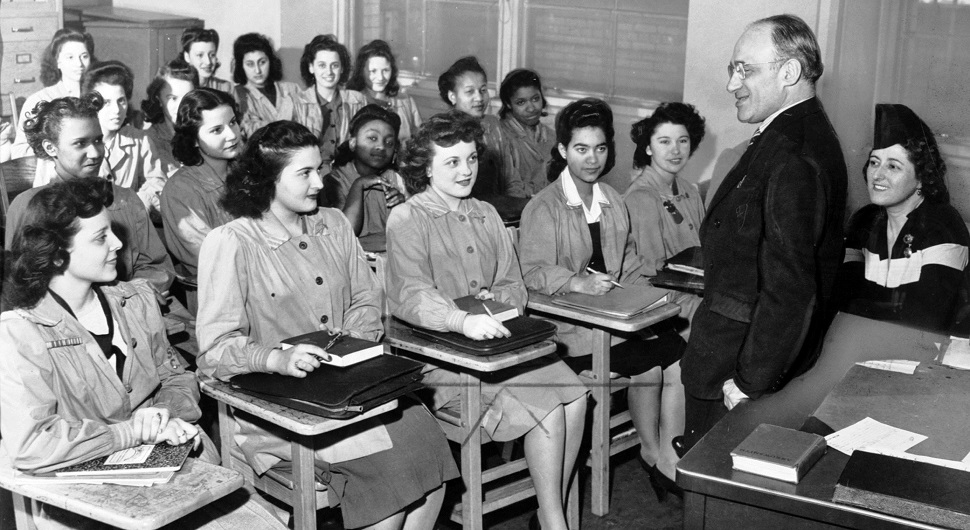Today’s guest post is from Georgia, a reader who grew up in the Independent Fundamental Baptist movement, left that behind, pursued an education, and eventually became a lawyer. “Learning the Words” is a series on the words many of us didn’t have in fundamentalism or overly conservative evangelicalism– and how we got them back. If you would like to be a part of this series, you can find my contact information at the top.
When my mother and father met, my mother talked to my father about the new movement she had heard of called homeschooling. It was 1983 or so, and the only people who were homeschooling were, frankly, a bit weird. The homeschooling movement appealed to my father because he was concerned that the public schools were intentionally dumbing down students. My mother was not a strong student, although she is bright; she found it too easy to tune out and stare out the window, and she wanted more direct control over her children’s education. I think morality played a role in their decision, for sure. But the idea that they were homeschooling in order to pursue a superior education was paramount.
My mother was really dedicated to legitimacy. She bought the Mennonite curriculum, Rod & Staff, because instead of pictures or bright colors it had long pages of math problems. She recorded every day’s activities in a set of record books, in case the government audited her and asked what she was doing. At this time, my mother said things like “Repetition is the key to learning!” and “Math will make you or break you in college!” Both of these sayings are inaccurate, but demonstrate that she cared about sending us to college. Sending me to college, even though I am female.
I don’t know what would have happened if we had stayed on this path. I think it is not impossible that I would have been encouraged to go to a real college; with a different set of circumstances maybe I would have been one of those early homeschoolers who gets into Harvard and claims homeschooling created great success.
Instead, my parents moved from California to Georgia when I was nine. My parents tried to find a non-denominational church they liked, but struggled. One day, my mother was researching private schools (which she did every once in a while, although nothing ever came of it). She found a church school in an unusual denomination called “independent fundamental Baptist.” We tried it out. My parents loved it. The pastor was very charismatic and very committed to long sermons which were heavy on Biblical study. Essentially, my parents viewed him as educated.
Interestingly, the pastor was a bit of an anomaly in his own denomination. Guest pastors said things like “I don’t need man’s learning to tell me how to interpret God’s word.” Our pastor was an intelligent man — he had studied to be an engineer before feeling God’s call. But he overlaid the anti-educational ideas of his theology over his own commitment to scholarship. Thus, the pastor prioritized finding the unaccredited Bible school of the moment which best aligned with every detail of his theology. The people who didn’t go to those schools were made to feel a bit second rate, a bit theologically suspect.
My family’s view of the role of women changed fairly radically with every year that they stayed with the IFB church. My mother really fought against the church’s restrictions at first. But, as the years went on, she became more convicted that this was the correct way. My family began to speak of my sister’s and my education as primarily a way to meet a husband at college and become a good mother, with a back-up career plan in case my husband died. I convinced them to let me go to college at 16 because I had a boyfriend and my mother thought I probably would want to marry him soon, so I should speed up my education.
It was not in question whether I would go to an accredited school. How would I meet a husband who shared my values at a school outside my specific denomination? How would I gain the Biblical values necessary to true education at a secular institution? I went to Pensacola Christian College for the 2002-03 school year. Even this was a concession to education, because my the women in my youth group were going to Crown College for an early childhood education degree with a minor in music (so that they could marry preachers, play piano in church, and be able to conduct at least a Sunday school and maybe a church-sponsored preschool).
Truth be told, I didn’t actually understand what accreditation was. I didn’t know that an unaccredited degree severely restricts educational options available, or that it essentially serves as a pipeline back into the church, the only place that will hire the graduates. Until I was at PCC for a year, I had never heard about seniors graduating, going home, and working at Wal-Mart because they could do little else and they didn’t have a church school to fall back on.
I was disappointed and disillusioned by PCC. I did not have to work at all to succeed in my classes. I took twenty credit hours my spring semester, worked the maximum hours allowed at the bookstore, and still had significant time to spend with my friends. I got a 4.0 that semester. More importantly, I was in a crisis of faith, because the restrictions were absurd, and the students cruelly urged to turn against each other by the administration. I heard about Liberty University in hushed tones from a fellow bookstore worker, who also kindly explained the importance of accreditation. Without access to internet, and only able to call the phone number she gave me, I worked out a transfer. I didn’t lose my credit hours because Liberty University was one of the very few accredited schools to accept credit hours from unaccredited institutions.
Many of the same problems still plagued me at Liberty. Although Liberty did not prioritize legalistic adherence to certain ideas like PCC, the school theology instead prioritized emotional response over argument and learning. I continued to struggle to believe in God, or in the ideals my parents taught me. But I did begin to discover true education. Some of my classes encouraged us to read texts which differed markedly from what we collectively were said to believe. The purpose for exposing us to these texts was something like “analyze through a Christian lens” but I can’t really say I did that. Instead, I read with interest and excitement. I joined the debate team, which radically shifted my thinking at a basic level. Through advocating positions I did not believe, I began to see statements and claims as a series of argumentative propositions — some better, some worse — and to apply a critical eye to things I had accepted as givens.
It’s not that I consider myself educated now because I ditched religiousness. I think education is a commitment to process rather than a commitment to outcome. The process of becoming educated involves informed consent — exposure to fair interpretations and original texts of other schools of thought, and a recognition that human beings have an imperfect grasp on Truth and must grope toward truth-little-t by exposing all ideas to rigorous argument and counter-argument. For me, many of the principles I grew up with did not pass the tests of rigorous argument. I have seen people who did satisfy themselves, or who have the capacity to bracket religiousness as something beyond the realm of logic and argument. But, it is hard for me to live with the not-knowing, and I envy without condescension those who have achieved some kind of balance between knowledge and faith.
Ultimately, I graduated with an accredited college degree. I took the LSAT on a whim and, because I test well, schools overlooked my questionable educational history. When I mentioned to my parents that I had applied to Berkeley’s law school, my mother completely melted down. She wrote me a letter which became infamous as the “Column A and Column B letter” among my friends. Column A included items like “Have a strong marriage and be a submissive wife” “Homeschool children” “Write for the John Birch Society” “Defend persecuted Christians.” Column B included items like “Prosecute companies for even small amounts of toxic waste” “Feminist marriage probably leading to divorce” “Children rebellious.” When I chose to attend Vanderbilt law, my parents did kindly help me move into my new Nashville apartment. We went to the corner store to pick up tape and the sweet Southern lady asked if we were moving in because I was going to Vanderbilt. I said yes, and she said to my mother “You must be so proud.” My mother made a face and said, “Kind of.”
I think she secretly became proud, though, over time, because I have heard from various sources that she likes to namedrop “my daughter the lawyer.” And once, when I was having an emotional conversation with her about why I feared getting married because I wanted an easy escape if my husband engaged in physical abuse like she had suffered, she said, “What happened to me would never happen to you. You are an educated woman.”







